

Web Literacy - Mozilla Learning. Fake, Fiction or Fact? How can learners be helped to work out what’s true? Books That Grow Reader — Books That Grow. Without, the night was cold and wet, but in the small parlour of Laburnam Villa the blinds were drawn and the fire burned brightly.
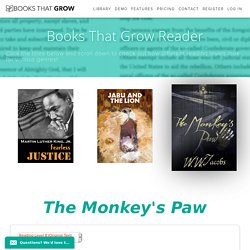
Father and son were at chess, the former, who possessed ideas about the game involving radical changes, put his king into such sharp and unnecessary perils that it even provoked comment from the white-haired old lady knitting placidly by the fire. "Hark at the wind," said Mr. White, who, having seen a fatal mistake after it was too late, was amiably desirous of preventing his son from seeing it.
SLJ’s School Ebook Market Directory. See feature Story on:How Two Schools are Riding the Transition to Ebooks Ebook providers offer different selections of titles with varying terms.
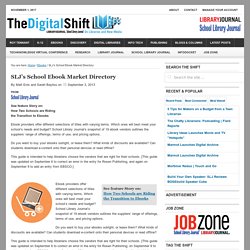
Which ones will best meet your school’s needs and budget? School Library Journal’s snapshot of 19 ebook vendors outlines the suppliers’ range of offerings, terms of use, and pricing options. IB Librarians Continuum - Info Lit & ICT Scope & Sequence. Dianne McKenzie - Discovery College Hong Kong - Presentation wiki for ECIS Triennial Librarian's Conference, Istanbul, Turkey Manitoba - Literacy with ICT - NYC Dept of **Information Fluency Continuum** NEW The Information Fluency Continuum provides a framework for the instructional aspects of a library program.
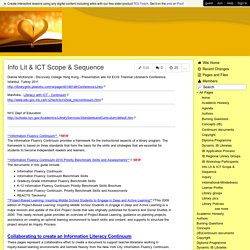
The framework is based on three standards that form the basis for the skills and strategies that are essential for students to become independent readers and learners. 20 Books Featuring Diverse Characters to Inspire Connection and Empathy. Librarians often talk about stocking the shelves with books that offer both mirrors and windows for children.
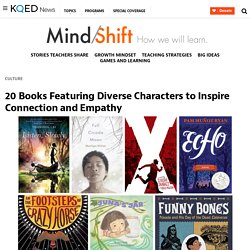
When one child picks up a book, he might see a character who looks like him and experiences life the way he does, but another child reading the same book could experience the story as a window into a new culture or life experience. The goal is for all children to read books that provide both mirrors and windows so they subconsciously build an image of who and what they could be, while building empathy and understanding for the lives of others.
Unfortunately in the children’s book world, there are far too few stories featuring diverse characters. “Diverse books are a tiny slice of what’s published,” said Elizabeth Perez, a children’s librarian at the San Francisco Public Library. “They’ve made some strides, but considering the diversity of the US, it’s still very small.” Teaching Information Literacy Now. Last week, a new study from Stanford University revealed that many students are inept at discerning fact from opinion when reading articles online.
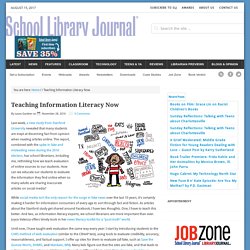
The report, combined with the spike in fake and misleading news during the 2016 election, has school librarians, including me, rethinking how we teach evaluation of online sources to our students. How can we educate our students to evaluate the information they find online when so many adults are sharing inaccurate articles on social media? While social media isn’t the only reason for the surge in fake news over the last 10 years, it’s certainly making it harder for information consumers of every age to sort through fact and fiction.
How to Make a Book Trailer. By Teacher Librarian Michelle Harclerode: www.booktrailersforreaders.com - Keep scrolling all the way down for lots of goodies & links to websites.
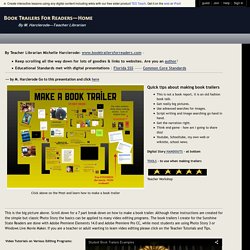
Are you an author? Educational Standards met with digital presentations : Florida SSS ----- Common Core Standards This is the big picture above. Tech-Inspired Ideas for Students' Summer Reading. Summer is just around the corner!
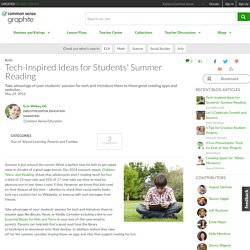
What a perfect time for kids to get swept away in the plot of a great page-turner. Our 2014 research report, Children, Teens, and Reading, shows that adolescents aren't reading much for fun; a third of 13-year-olds and 45% of 17-year-olds say they've read for pleasure one to two times a year, if that. However, we know that kids read on their devices all the time -- whether to check their social media feeds, look up a random fact on Wikipedia, or keep up with text messages from friends. How Google Impacts The Way Students Think. The Hardest Type of Web Search for Students. There are three basic types of searches that students conduct on the Internet.
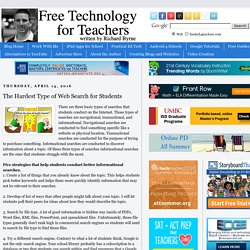
Those types of searches are navigational, transactional, and informational. Navigational searches are conducted to find something specific like a website or physical location. Transactional searches are conducted for the purpose of trying to purchase something. Informational searches are conducted to discover information about a topic. Of these three types of searches informational searches are the ones that students struggle with the most. Five strategies that help students conduct better informational searches. 1. 16 Children's Books That Will Make You See The World Differently. If you love reading as much as I do, then you probably remember the very first book you ever read, all on your own.
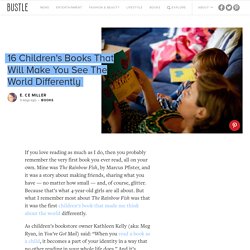
6 Online Resources for Keeping Up with Library Trends » LibraryScienceDegree.org. As a professional or student, one of the most important skills to hone is maintaining a working knowledge of library trends and issues.
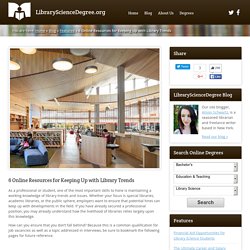
Whether your focus is special libraries, academic libraries, or the public sphere, employers want to ensure that potential hires can keep up with developments in the field. If you have already secured a professional position, you may already understand how the livelihood of libraries relies largely upon this knowledge. How can you ensure that you don’t fall behind? Because this is a common qualification for job vacancies as well as a topic addressed in interviews, be sure to bookmark the following pages for future reference.
10 Very Good Tools for Student Researchers. January 27, 2016 One of the onerous parts in essay and academic writing is the bibliography section. Managing, organizing and citing references can sometimes be a real challenge especially if you don't keep track of what and who you cite. The last thing you want after a strenuous writing task is a messy bibliography with one reference missing a page number, the other needs publication date or, worse of all, having to go back to your sources to check for the source of that quotation you included in your conclusion. 6 Active Learning Spaces Your Library Should Have. Active Learning Spaces In the book Get Active: Reimagining Learning Spaces for Student Success, the authors identify six types of active learning spaces that are essential for creating an engaging learning environment for students.
While this research (and this book) are not specifically focused on school libraries, we are the ideal place in our schools to encompass all six types of learning spaces in one location. We are the learning hubs of our schools after all. :) You might find that many of these spaces will overlap in your library, or that their purpose might shift depending on the day. That’s totally normal considering how flexible our spaces have to be. Aim for having all six areas available as much as possible. Supporting Materials. PowerUp / HISD -The Future is Now. Technology—Students and staff must have equitable access to the latest technology, tools, infrastructure, and cyber safety guidelines to support digital-age instruction, collaboration, and the development of 21st-century skills. Part of this effort includes the district’s one-to-one laptop program, which will provide every high school student with a laptop to use for learning at school and at home by 2016.
The “HUB”—A digital teaching and learning platform that will eventually become the hub of collaboration, curriculum, instruction, and communication for HISD staff, students, and parents. When fully implemented in 2015-2016, the “HUB” will allow all HISD educators to create and share instructional resources and assignments, enable students to tailor their classes to their own personal learning profile, and allow parents to track their children’s progress. Teenreads. How to Get Free eBooks on Your Mobile Device. This is a guest post from Jennifer Carey (@TeacherJenCarey) of EdTechTeacher - an advertiser on this site. With the rise and prominence of eBooks have come a number of resources for educators and students to access free content on virtually any device.
Using e-readers, tablets, or computers; in conjunction with apps such as Kindle, Nook, iBooks, Google Play Books, and OverDrive; you can access libraries of books for free on virtually any device. By downloading these free apps, you make your device a digital reading device that is not dependent on a specific vendor. One Book to Connect the World. Global Digital Citizenship—in 15 Minutes! (Information Fluency) This is the second part of a series we call Global Digital Citizenship in 15 Minutes. Helping Students Learn to Cite Their Sources. Mamascout: 25 mini-adventures in the library. Transforming our Learning Environment into a Space of Possibilities: Serendipity: The next chapter of my story. Serendipity means finding something good without looking for it.
Getting to E: The State of the School Ebook Market. School-library-guidelines.pdf. Metaphors and Threshold Concepts for Research — Katie Day. Borrow Modern eBooks. Click here to skip to this page's main content. Hello! Section 1: Reading the Web: Kraken the Code. 23 Great Library Blogs. Let’s say that you are a school librarian, and let’s say you’ve decided that like many of the teachers in your school, you too are ready to use a blog to connect with parents and students, to share your latest news and events, or perhaps to develop your own personal learning network (PLN).
You’re motivated and ready to begin, but you may have some lingering questions about the best way to get started and maybe you’re not entirely sure how to organize your new blog. Unfortunately, searching the internet for “how to create a great library blog” doesn’t yield many helpful answers. There are some sites that come up in that search that appear useful, but overall it seems to make more sense to just visit library blogs, see what works and what doesn’t, and craft your blog around the ideas you like the best. The Research Safari - Home. Books To Inspire Kids To Change The World. New & Improved Libraries. IB Ebook Library Collection – IBSOURCE. The best free cultural & educational media on the web - Open Culture. Going Retro: Reading Apps for Real Books. Reading Rainbow app YouTube clips. Texting. Twitter. Facebook status updates.
Two Very Good Book Search Engines for Teachers. Bookopolis. A Media Specialist's Guide to the Internet: Amazing! 74 Infographics for Teacher-Librarians (L.A. Teachers Too!) It's a Book by Lane Smith. Browse OER Materials. WatchKnowLearn - Free Educational Videos for K-12 Students. Top Documentary Films - Watch Free Documentaries Online. PowerMyLearning Educational Games & Learning Activities for Kids. Curation Tools. Free Reading Program.
Field Trip Library. Google Lit Trip. Library Grits: Online Projects. Washington International School: A DC independent school with a global curriculum Academics » Libraries. Acadia University Library. Welcome to Fort Worth Country Day Libraries. The PYP Library. Western Academy of Beijing (HS) The MHMS Daring School Library Blog. Putting the rarin back in librarian since 1999. NeverEndingSearch — @joycevalenza by Joyce Valenza. Expect the Miraculous. 21st-Century Libraries: The Learning Commons. What Does the Next-Generation School Library Look Like?
Enhancing Collaboration and Innovation Through Better Design. Learning Spaces. Not So Distant Future — technology, libraries, and schools. Tech project changed how we view our librarians. 2014-nmc-horizon-report-library-EN.pdf. How Can Your Librarian Help Bolster Brain-Based Teaching Practices? How Libraries are Advancing and Inspiring Schools and Communities. Writing Commons. Teaching Adolescents How to Evaluate the Quality of Online Information.
Overview — Plagiarism.org - Best Practices for Ensuring Originality in Written Work. Welcome! - CRAP Test: Evaluating Websites - Research Guides at South Mountain Community College. Teaching Information/Research Skills in Elementary School. Inquiry learning & information literacy. Research and Citation Tools for Students. The 8 Pillars of Digital Literacies. Building Good Search Skills: What Students Need to Know.
ICL Presentation for Parents - Google Slides. Information Literacy And Digital Literacy: Life Long Learning Initiat… How to prepare your students for the Extended Essay. March 2015: Literacies for the digital age: Information and digital literacy. Writing Our Way Into Inquiry and Presearch. Donald J. Leu - New Literacies Research Lab. How Are Students’ Roles Changing in the New Economy of Information?